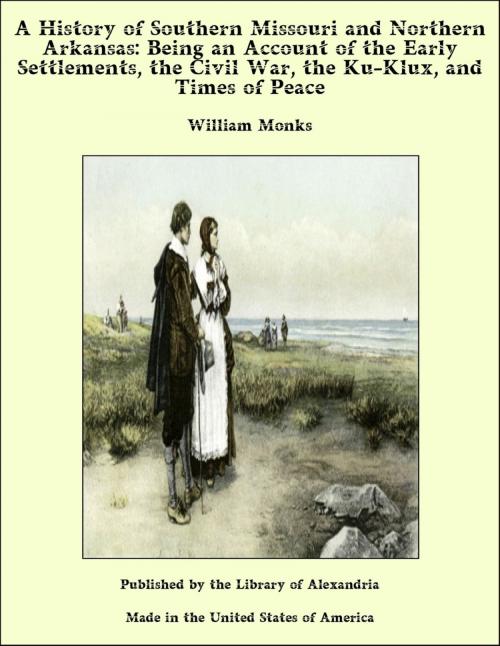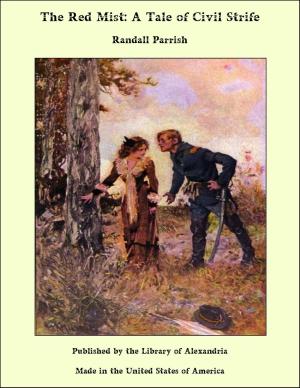A History of Southern Missouri and Northern Arkansas: Being an Account of the Early Settlements, the Civil War, the Ku-Klux, and Times of Peace
Nonfiction, Religion & Spirituality, New Age, History, Fiction & Literature| Author: | William Monks | ISBN: | 9781465610355 |
| Publisher: | Library of Alexandria | Publication: | March 8, 2015 |
| Imprint: | Language: | English |
| Author: | William Monks |
| ISBN: | 9781465610355 |
| Publisher: | Library of Alexandria |
| Publication: | March 8, 2015 |
| Imprint: | |
| Language: | English |
In the year 1844 father sold out and in May started to move to the state of Texas; crossed the Mississippi river at Green's old ferry, came by the way of Jackson, Missouri, and traveled the old military road made by the government troops in removing the Cherokee Indians from the state of Alabama to their present location—only road leading west—and in July of the same year (learning that it was very dangerous for a man to take his family into the state of Texas on account of the Indians), he concluded to locate in Fulton county, Arkansas, purchased an improvement and located on what is known as Bennett's river, about 25 miles from where West Plains is now located. The family at that time consisted of six persons, to-wit: father, mother and four sons, the author then being in his fifteenth year; father, being a farmer by occupation, went to work on the farm. The country at that time was very sparsely settled. The settlements were confined to the creeks and rivers, where were found plenty of water and springs. No place at that time was thought worth settling unless it had a spring upon it. The vegetation was luxuriant, the broom sedge and blue stem growing as high as a man's head—and he upon an ordinary horse. The table lands, which were thought at that time to be worthless, had very little timber growing on them, but were not prairie. There were what were known as post oak runners and other brush growing on the table lands, but the grass turf was very heavy and in the spring of the year the grass would soon cover the sprouts and the stranger would have taken all of the table lands, except where it was interspersed with groves, to have been prairie. The country settled up—some of the settlements being 15 miles apart—yet the early settlers thought nothing of neighboring and assisting each other as neighbors for the distance of 15 miles. At that time Fulton county contained all of the present territory that now includes Baxter, Fulton and a part of Sharp counties; and but a short time previous to the organization of Fulton, all of the territory that now embraces Fulton, Baxter and Sharp; Izard belonged to Independence county and Batesville was the county seat. My father located about five miles from the state line. Ozark county, in Missouri, joined Fulton county on the state line and all of the territory that now comprises Ozark, Douglas and the west half of Howell, belonged to Ozark county and Rockbridge, its county seat, being located on Bryan's Fork of the North Fork, about 50 miles from the state line. Oregon county contained all the territory that now comprises Oregon, Shannon, and the east end of Howell; and a short time previous all of the territory that now comprises Ripley, Oregon, Carter and Shannon belonged to Ripley county; and all of the territory that now comprises Texas, Dent, Wright and Crawford counties belonged to Crawford county. The country at that time abounded in millions of deer, turkeys, bears, wolves and small animals. I remember as my father was moving west and after he had crossed White Water near what was known as Bullinger's old mill, that we could see the deer feeding on the hills in great herds like cattle, and wild turkeys were in abundance. Wild meat was so plentiful that the settlers chiefly subsisted upon the flesh of wild animals until they could grow some tame stock, such as hogs and cattle. This country then was almost a "land of honey." Bees abounded in great number and men hunted them for the profitthey derived from the beeswax. There was no such thing known as a bee moth.
In the year 1844 father sold out and in May started to move to the state of Texas; crossed the Mississippi river at Green's old ferry, came by the way of Jackson, Missouri, and traveled the old military road made by the government troops in removing the Cherokee Indians from the state of Alabama to their present location—only road leading west—and in July of the same year (learning that it was very dangerous for a man to take his family into the state of Texas on account of the Indians), he concluded to locate in Fulton county, Arkansas, purchased an improvement and located on what is known as Bennett's river, about 25 miles from where West Plains is now located. The family at that time consisted of six persons, to-wit: father, mother and four sons, the author then being in his fifteenth year; father, being a farmer by occupation, went to work on the farm. The country at that time was very sparsely settled. The settlements were confined to the creeks and rivers, where were found plenty of water and springs. No place at that time was thought worth settling unless it had a spring upon it. The vegetation was luxuriant, the broom sedge and blue stem growing as high as a man's head—and he upon an ordinary horse. The table lands, which were thought at that time to be worthless, had very little timber growing on them, but were not prairie. There were what were known as post oak runners and other brush growing on the table lands, but the grass turf was very heavy and in the spring of the year the grass would soon cover the sprouts and the stranger would have taken all of the table lands, except where it was interspersed with groves, to have been prairie. The country settled up—some of the settlements being 15 miles apart—yet the early settlers thought nothing of neighboring and assisting each other as neighbors for the distance of 15 miles. At that time Fulton county contained all of the present territory that now includes Baxter, Fulton and a part of Sharp counties; and but a short time previous to the organization of Fulton, all of the territory that now embraces Fulton, Baxter and Sharp; Izard belonged to Independence county and Batesville was the county seat. My father located about five miles from the state line. Ozark county, in Missouri, joined Fulton county on the state line and all of the territory that now comprises Ozark, Douglas and the west half of Howell, belonged to Ozark county and Rockbridge, its county seat, being located on Bryan's Fork of the North Fork, about 50 miles from the state line. Oregon county contained all the territory that now comprises Oregon, Shannon, and the east end of Howell; and a short time previous all of the territory that now comprises Ripley, Oregon, Carter and Shannon belonged to Ripley county; and all of the territory that now comprises Texas, Dent, Wright and Crawford counties belonged to Crawford county. The country at that time abounded in millions of deer, turkeys, bears, wolves and small animals. I remember as my father was moving west and after he had crossed White Water near what was known as Bullinger's old mill, that we could see the deer feeding on the hills in great herds like cattle, and wild turkeys were in abundance. Wild meat was so plentiful that the settlers chiefly subsisted upon the flesh of wild animals until they could grow some tame stock, such as hogs and cattle. This country then was almost a "land of honey." Bees abounded in great number and men hunted them for the profitthey derived from the beeswax. There was no such thing known as a bee moth.















